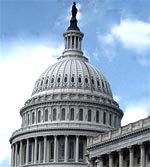 Online journal DOD Buzz has some buzz that you might want to hear. Or maybe not.
Online journal DOD Buzz has some buzz that you might want to hear. Or maybe not.
Reporting on a speech by Jim Jones, Obama’s national security advisor, to the newly-formed Senate Aerospace Caucus, the journal quoted an unnamed “congressional source” throwing water on the idea of a single export licensing agency
A congressional source who knows arms export issues reacted this way when asked about the prospects for legislation that would be needed to get things moving: “Not good. It’s a massive change for a single agency, and rationale has not yet been provided.â€
The main reason for congressional caution are memories of what many people believe was the disastrous result of the creation of the Department of Homeland Security, this source said
Although I have no doubt that Congress is not likely to support export control reform — at least the parts that must be approved by Congress — I think the source’s citation of the “disastrous results” of creating DHS is an effort to put another face on the real reason why Congress won’t get on board. While DHS may not have accomplished everything that was hoped for it, calling it a disaster is an overstatement.
The problems that export reform will face in Congress are based more on politics than on policy. Many GOP congress members can be counted to vote against anything that comes from the White House. And the Dems, facing the uphill battle of midterm elections, don’t see any political upside with constituents in supporting a proposal that the constituents don’t understand. Worse they fear that their opponents can hurl an accusation that they are weak on national security for supporting a plan that, so the accusation would go, allowed companies to export uranium enrichment centrifuges and suitcase nukes to the Taliban.
Much of the proposed export reform, particularly to the extent that it involves rewriting existing regulations, can be accomplished without having to get a permission slip from the Hill. But the single licensing agency requires Congressional approval that looks, increasingly, like it might not be obtainable.

 Posted by
Posted by  Category:
Category: 

 A retired Air Force colonel, John O’Toole, and an Israeli aeronautics engineer, Chanoch Miller, are the subjects of a recently unsealed
A retired Air Force colonel, John O’Toole, and an Israeli aeronautics engineer, Chanoch Miller, are the subjects of a recently unsealed  Regular readers are no doubt familiar with this blog’s occasional posts poking fun of press releases from defense manufacturers noting that the company had “achieved” registration with the State Department’s Directorate of Defense Trade Controls (“DDTC”). A common feature of many of these press releases is to try to portray registration under
Regular readers are no doubt familiar with this blog’s occasional posts poking fun of press releases from defense manufacturers noting that the company had “achieved” registration with the State Department’s Directorate of Defense Trade Controls (“DDTC”). A common feature of many of these press releases is to try to portray registration under 
 House and Senate conferees
House and Senate conferees 

